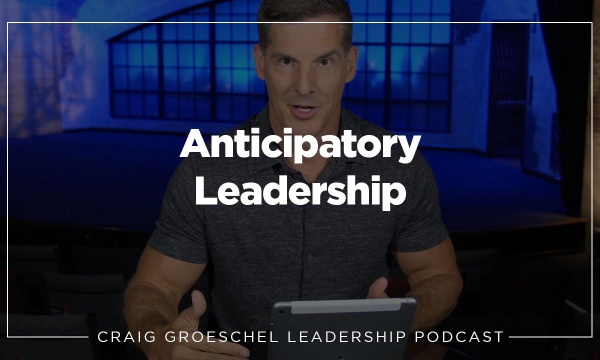Thank you for joining the Craig Groeschel Leadership Podcast! One of the most important skills you can develop as a leader is selecting, developing, and empowering the right people. The potential of your organization rests on the strengths of its people. You can have the best product, best strategy, or best vision, but without the best people, your organization will always be limited! Jim Collins said it this way: “People are not your most important asset. The right people are.”
Let's talk today about two principles of great hiring. In next month's episode, we'll cover two more.
1. Begin with the end in mind.
This one sounds simple, but many leaders overlook it. When you're writing a job description, be clear about what type of person you want—don't just list duties, list characteristics the person needs to have. A general idea of what you want won't help you fill a specific role.
I always suggest looking within your organization before looking outside, with one exception: If the culture is unhealthy, you may be better off looking outside. However, if you want to guard the culture, hire from within as often as possible.
2. Be ruthlessly selective.
The best time to fire is before you hire. Making no hire is better than making a bad hire. The cost of hiring a bad team member is greater than cost of missing a good one. Wrong hires early make it more difficult to make great hires later.
At my church, we’ve been told that we have the most rigorous hiring process people have ever seen. Why so rigorous? We believe in the mission of what we do, so we won't settle for anything but the best people!
Never hire someone out of desperation, and be careful when you find yourself talking yourself into hiring a candidate. When you're exhausted and you're just looking for help, you're vulnerable to making a bad hire. When you see something that concerns you about a candidate, don't try to make excuses for them—dig in! If the right person isn't there, it's not the right time to hire.
Before next month’s episode, do these two things yourself or with your team.
1. Define your core values. What do you stand for?
What you value determines what you do. What you value determines how your team will behave. Values create culture—before you add to your team, be clear on what you value. If you want to look a little closer at how you define your core values, check out two earlier episodes on this podcast, “Creating a Value-Driven Culture,” Part 1 and Part 2.
2. List your top behavioral values.
This isn’t what we believe, it’s how we behave. Look at the top five performers in your organization, or define the behaviors you are looking for: How do they work? What practical qualities do they have? Are they driven? Creative? Fun? Passionate? Flexible? Focused?
Remember, you don’t have to know it all to be a great leader! Be yourself. People would rather follow a leader who is always real than one who is always right.
LISTENER QUESTIONS
I have a number of team members who essentially need their hand held throughout a project, so how do I delegate to these staff members? – Casey
- You might need to be more clear on the front end about exactly what is expected. The reason you need to micromanage might be because they don’t clearly understand your expectations.
- You might need more grace as your team grows. For your team to improve, you might need to allow them to fail. This isn’t easy! It’s like a parent who wants to help a child with homework at the last minute. The wisest thing you can do is let them face consequences and learn. Give them grace as long as you see improvement.
- You might need to upgrade your team. If you’ve been clear on expectations, given them all the tools they need, and given grace and time to grow into their responsibilities, then you may be working with the wrong people. Eventually, if they don’t get it right, they are no longer the problem.
How do you give confidence to those still new on the journey and kindly remind the "long-haulers" that they aren't always the smartest person in the room with all the answers? – Bryant
Teach the whole organization that every player adds value. The seasoned team members have wisdom from years on the job. No matter how talented a new team member is, there is no substitute for experience. But, on the other hand, the longer you are in an organization, the more difficult it is to be objective. Andy Stanley said it this way: "Time in erodes awareness of." We must maximize the insight and perspective of new team members. In fact, team members may be more valuable in their first 90 days than in their second 90 days.
Have a question for Craig? Email him at leadership@life.church.
EPISODE RESOURCES
Leave a review: www.go2.lc/leadershippodcastitunes
Catalyst One Day: www.catalystconference.com/oneday
Watch Life.Church messages: www.life.church/watch
More from Craig: www.craiggroeschelbooks.com
Craig Groeschel, Divine Direction: 7 Decisions That Will Change Your Life
Free church resources & tools: www.life.church/churches
Craig Groeschel Leadership Podcast: Creating a Value-Driven Culture, Part 1 and Part 2
Ed Catmull, Creativity, Inc.: Overcoming the Unseen Forces That Stand in the Way of True Inspiration
Bill Hybels, Courageous Leadership: Field-Tested Strategy for the 360° Leader
Patrick Lencioni, The Ideal Team Player: How to Recognize and Cultivate the Three Essential Virtues: A Leadership Fable
Brad Lomenick, H3 Leadership: Be Humble, Stay Hungry. Always Hustle.
CONNECT WITH CRAIG
Ask questions: leadership@life.church
Facebook: www.facebook.com/craiggroeschel
Twitter: @craiggroeschel
Instagram: @craiggroeschel
Snapchat: @craiggroeschel
Periscope: @craiggroeschel



